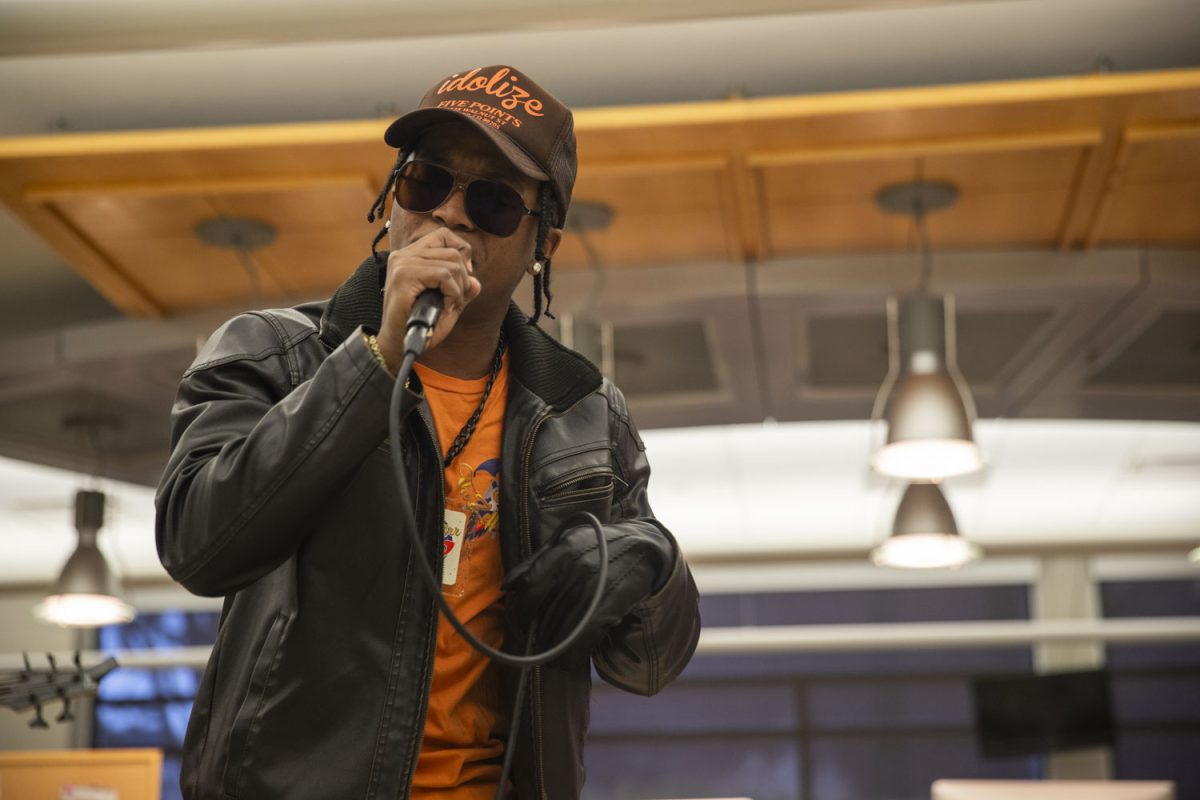UI International Programs is operating, apparently, at full charge.
“I don’t need coffee; I’m already pretty wired,” said Gerhild Krapf, the UI International Programs director of external relations, at T-Spoons last week. Ever since she took the recently established position, in April 2009, she has been mining the International Programs’ lode of resources.
Her latest brainchild is Prairie InSight, a monthly public discussion sponsored by International Programs, Prairie Lights Books, 15 S. Dubuque St., and City Channel 4.
The series’ first meeting “The World’s Our Stage: Why Internationalization?,” will occur at 5 p.m. today in Prairie Lights. The round table, moderated by Krapf, is free and open to the public.
“ ‘Internationalization’ has many different connotations,” said Downing Thomas, the International Programs dean. “[It] can mean something very positive, or it can indicate great changes or challenges, or it can even have negative connotations.”
Thomas and other invited guests from numerous professional backgrounds will present their experiences and thoughts on internationalization.
“With this program, I hope to connect the community on a number of levels,” Krapf said. “I feel as though this community consists of many concentric circles, and we’re not drawing the lines to connect them.”
She envisions a casual format for Prairie InSight. She considers the Times Club Wine Bar and Café on Prairie Lights’ second floor as the perfect atmosphere. In this room, Robert Frost, Langston Hughes, and e.e. cummings held salons — a forum for intellectuals to gather and debate relevant issues — in the 1930s (though, of course, the site did not yet house Prairie Lights).
“The salon format can be like a living room,” Krapf said. “Everyone can come in and out as they please … and if they’re thirsty, they’re more than welcome to just get up and go get a coffee in the café.”
After the six scheduled guests complete their abridged presentations, audience members are encouraged to generate conversation on international perspectives.
“These days, you can walk out into the halls here in the business building and hear languages being spoken from all over the place,” Terry Boles, a UI associate professor of management and organizations. “This wouldn’t have been true back when I first came here in 1993.”
Thomas agreed that the UI campus has seen a greater influx of international students than before. Now, he said, the challenge is to maintain a welcoming environment.
“[Prairie InSight] is important because the state of Iowa has been international for quite some time in areas such as trade and humanitarian involvement,” he said. “This is just following an Iowa tradition of reaching out to the world and moving toward greater global involvement.”
He pointed to the worldwide response to the Iowa floods in the summer of 2008 as an example of a global community: The state received aid from as far away as South Korea from people who know and love the area. He is working to organize local interest in Haitian relief efforts with people who now feel linked to their international neighbors.
“Becoming more responsible citizens only comes through mutual understanding and dialogue,” Thomas said. “With [Prairie InSight], I want to see a dialogue about international education … and I wish to see more awareness in international affairs.”
Today’s pilot discussion will serve as a general platform for the series. In following months, topics will be built on selected book readings with an international scale. For February, Krapf anticipates a theme built on “journeys” to coincide with a 20-minute reading by Matthew Davis depicting his transformational odyssey in When Things Get Dark: A Mongolian Winter’s Tale.
“Internationalization is all about understanding — it can be small or large,” Krapf said.
Thomas believes that immersing oneself in new cultures can be a leap of faith. When he first went abroad, to France, he was confronted by huge differences in conventional ideas and customs that challenged those of his native Texas homeland, he said.
“Recognizing these differences makes you think a lot about your assumptions, your beliefs, and it allows you to become a more accepting and tolerant person,” he said. “I have heard over and over from students who have come back from studying abroad who describe their time abroad as a really transforming experience.”
Even if one remains in Iowa, the effect of internationalization is noticeable.
“I tell my students now that even if they plan to stay forever in Iowa, if you’re buying and selling corn, nowadays, you’re going to have to deal with businesses in other countries,” Boles said. “Knowing another language used to not matter so much in the business world, but now it matters a lot.”
The recent collaboration in the International Programs’ new external affairs branch, he believes, particularly between Krapf and senior communications adviser Joan Kjaer, has been an asset to the community.
“This town has so much to offer,” Krapf said. She has more ideas to promote the international community in Iowa City, including outreach projects. “More and more people are coming here who are not Iowans.”
A native of Iowa City, Krapf believes the best way to stay alive in life is to be creative and curious.
“We should all be engaged in the things going on around us,” she said. “Everyone is responsible for developing one’s own growth.”






